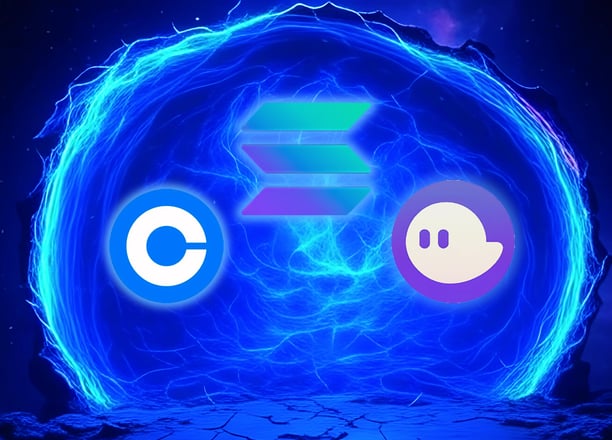Crypto 101
Helping beginners understand cryptocurrency and its benefits for everyday use.


Low fees, inflation protection, instant transfers.
(1) Set up Phantom Wallet, (2) Buy SOL/USDC on Coinbase, (3) Secure your wallet.
Digital money on a blockchain—secure, global, bank-free.
References and Resources for getting started
What Is Crypto?
Imagine biting into the best apple you've ever tasted, and you want to tip the farmer directly to show your appreciation for its deliciousness. With cryptocurrency, you can scan a QR code and send $2 in Solana (SOL) instantly, with a fee of just a penny—no bank account or cash needed. That’s the power of crypto—digital money that’s secure, fast, and puts you in control. Let’s break it down.
Crypto is simpler than you think—digital money that puts you in control.
What Is Cryptocurrency?
Crypto is digital money that lives on a blockchain—a super-secure online ledger that tracks ownership without banks. Unlike dollars in a bank, crypto isn’t controlled by any one company or government. It’s powered by code and a global network, making it transparent and accessible to anyone with a smartphone and internet. Think of crypto like digital cash you can:
Send instantly to anyone, anywhere (e.g., tip a farmer in seconds).
Store securely in a digital wallet you control (no bank can freeze it).
Use for payments, savings, or even big purchases like a home.
Popular cryptocurrencies include Bitcoin (BTC), Solana (SOL), and USDC (a “stablecoin” tied to the U.S. dollar). At EODSOL, we focus on Solana and USDC because they’re fast, affordable, and perfect for beginners and businesses.
Crypto runs on a blockchain, which is like a digital notebook that’s: Secure: Transactions are locked with advanced math (cryptography).
Transparent:
Everyone can see the ledger, so it’s hard to cheat.
Decentralized:
No single entity (like a bank) controls it—power is shared globally.
The blockchain records the payment forever, and you control your funds without a bank telling you what you can or can’t do. That’s the power of crypto.
How does it work?
Why Should You Care?
Crypto is already here: Restaurants are testing SOL payments, creators are selling digital art as NFTs, and some folks are even saving for homes with crypto (yes, it’s possible!). With EODSOL, you’ll learn to use it safely and easily.
Crypto isn’t just for tech experts—it’s a game-changer for small businesses, creators, and anyone wanting more control over their money.
Here’s why it matters:
Save Money: Pay pennies per transaction, not 2–3% like credit cards. A local restaurant in Tucson could save thousands per year on fees.
Own Your Funds: With a wallet like Phantom, you hold the keys—no bank can freeze your account or charge hidden fees.
Go Global: Send or receive payments anywhere, 24/7, without delays. Perfect for freelancers working with international clients.
Protect Your Wealth: Crypto like USDC or SOL can diversify your savings, shielding you from inflation or economic shifts.
Future-Proof: Crypto is growing fast—businesses accepting it now (like shops on 4th Avenue) attract tech-savvy customers.
Crypto can feel intimidating, but it’s safe when you use trusted tools and follow simple rules.
At EODSOL, we use:
Coinbase: A beginner-friendly app to buy, sell, and hold crypto like SOL or USDC. It’s as easy as using PayPal.
Phantom Wallet: A secure Solana wallet where you control your funds with a private “seed phrase” (like a password you keep offline).
Solana Blockchain: Fast, low-cost, and reliable, with transactions verified by a global network.
Safety tips we teach:
Never share your seed phrase.
Store it offline (e.g., written on paper in a safe).
Start small to learn the ropes.
With our consulting packages, we’ll guide you step-by-step to keep your crypto secure, so you can focus on the benefits.
Why Tucson?
From Tucson’s farmers’ markets to global markets, crypto is changing how we pay, save, and grow. As a Tucson-based Web3 consulting firm, EODSOL is here to bring this revolution to our community and beyond. Whether you’re a vendor at Farmer's Market or an international business reaching clients worldwide, crypto gives you an edge.
Why Crypto?
Picture running your Tucson small business, selling art globally, or saving for a dream home without banks slowing you down or charging high fees. Cryptocurrency makes this possible, giving you control, savings, and access to a global economy.
Here’s why crypto gives you an edge with some real life examples:
1. Save Money on Fees
Crypto transactions cost pennies, unlike the 2–3% fees charged by credit card companies or payment apps like PayPal. This means more money stays in your pocket, whether you’re a business owner or an individual.
Rose runs a coffee shop on University Boulevard and accepts Solana (SOL) via a Phantom Wallet QR code. A $10 latte sale incurs a $0.01 fee, compared to $0.30–$0.50 with credit cards. With 1,000 sales monthly, Rose saves $290–$490 a month, reinvesting in better beans or marketing to outshine competitors stuck with traditional payments.
Lower fees let you keep more profit, giving you a financial edge over businesses reliant on costly payment processors.
2. Take Control of Your Money
With crypto, you hold the keys to your funds using a wallet like Phantom—no bank can freeze your account, charge hidden fees, or limit your transactions. This self-custody puts you in the driver’s seat.
Javi, a Tucson caterer, uses a Phantom Wallet to store USDC for his business. When a bank once froze his account over a paperwork issue, he lost a week’s revenue. With crypto, Javi’s funds are always accessible, and he can pay suppliers or staff instantly, even on weekends, without bank approval.
Unlike traditional accounts, crypto gives you full control, protecting you from unexpected freezes or restrictions and letting you operate on your terms.
3. Go Global, Instantly
Crypto works 24/7 across borders, letting you send or receive money anywhere in seconds, without delays or high fees. This opens doors for Tucson businesses and creators to compete globally.
Elena, a jewelry maker at Tanque Verde Market, sells her handmade necklaces as NFTs on Solana. A buyer in Paris purchases one for 5 SOL ($75) via Magic Eden, with a $0.02 fee, and Elena gets paid instantly. Traditional platforms like Etsy take 5–10% fees ($3.75–$7.50) and days to process international payments, slowing her cash flow.
Advantage: Crypto’s speed and low costs let you reach global customers or clients faster than competitors using slow bank transfers or payment platforms.
4. Protect Your Wealth
Crypto like USDC (tied to the dollar) or SOL (a growing asset) can diversify your savings, shielding you from inflation or economic uncertainty. It’s a way to future-proof your finances.
Mike, a Tucson teacher, saves $200 monthly in USDC using Coinbase. Unlike a bank savings account with 0.5% interest, USDC can be staked for 4–8% annual returns (via platforms like Solana’s Marinade). When inflation hit 7% last year, Mike’s crypto savings held their value, unlike cash losing purchasing power.
Crypto offers better returns and flexibility than traditional savings, helping you grow wealth faster and stay ahead of economic shifts.
5. Future-Proof Your Business or Goals
Crypto is growing fast, and early adopters gain a competitive edge. From accepting payments to saving for big goals like buying a home, crypto positions you for the future.
Lisa, a food blogger, accepts SOL tips for her reviews using a Phantom Wallet QR code. Fans tip $5–$10 per post, building her savings. She converts SOL to USDC on Coinbase, aiming to fund a home down payment. Traditional tip jars or Venmo charge fees and lack global reach, limiting her earnings.
Crypto lets you attract tech-savvy customers, save efficiently, and tap into emerging trends, giving you a head start over those stuck with outdated systems.
Unlock Freedom, Savings, and Opportunity
Crypto is already transforming Tucson: food trucks on Speedway save on fees, artists sell globally, and locals save smarter. With EODSOL’s Tucson-based consulting, you can join the revolution without the overwhelm. Our monthly packages offers weekly tips and personalized guidance, or our treasury setup service. No tech skills needed—just a smartphone and curiosity.
Why Start Now?
Get Started
Get Started with Crypto: Your 3-Step Guide
Ready to tip a Tucson farmer, accept payments for your food truck, or save for your future with crypto? Getting started is easier than you think. With just a smartphone and a few minutes, you can set up a wallet, buy crypto, and secure your funds. EODSOL Consulting, based right here in Tucson, makes it simple with our monthly consulting package and treasury setup service. Follow these three steps to join the Web3 revolution and gain the edge over traditional finance.
Start using crypto in minutes—no tech skills needed
Step 1: Set Up a Phantom Wallet
Your crypto journey starts with a wallet—a secure digital “bank account” you control. We recommend Phantom Wallet, a free, beginner-friendly app for the Solana blockchain, perfect for storing Solana (SOL) or USDC (a stablecoin tied to the dollar).
How to Do It:
Download the Phantom browser extension (phantom.app) or mobile app (iOS/Android).
Click “Create New Wallet” and follow the prompts to set it up (takes 2–3 minutes).
Save your seed phrase (a 12-word password) on paper and store it somewhere safe, like a locked drawer. Never share it—this is your key to your funds.
Mary, a vendor at the Rincon Market, sets up a Phantom Wallet in 5 minutes. She displays a QR code for customers to tip her in SOL for her homemade salsas, keeping 100% of her earnings without bank fees.
Unlike a bank account, Phantom gives you full control—no one can freeze your funds or charge you fees for access.
Step 2: Buy Crypto on Coinbase
Now that you have a wallet, it’s time to add crypto. Coinbase is a trusted, easy-to-use platform to buy Solana (SOL) or USDC, like a bank app but for crypto. SOL is great for fast, low-cost payments, while USDC is stable for saving or spending.
How to Do It:
Sign up at coinbase.com (free, takes 3–5 minutes).
Link a bank account or debit card to buy crypto (start with $10 to test).
Search for SOL or USDC, buy your desired amount, and send it to your Phantom Wallet’s public address (copy it from Phantom).
Carl, a Tucson artist, buys 10 SOL ($150) on Coinbase and transfers it to his Phantom Wallet. He uses it to list an NFT on Magic Eden, selling globally without the 5–10% fees of platforms like Etsy.
Coinbase makes buying crypto as easy as online shopping, and Solana’s low fees let you keep more money compared to traditional payment platforms.
Step 3: Secure Your Wallet
Crypto puts you in control, but with that power comes responsibility. Securing your wallet ensures your funds are safe from hackers or accidents.
How to Do It:
Write down your Phantom Wallet’s seed phrase (12 words) and store it offline (e.g., in a safe or locked box). Never save it digitally.
Enable two-factor authentication (2FA) on Coinbase for extra security.
Test a small transaction (e.g., send $1 in USDC to a friend’s wallet) to build confidence.
Sophie, a Midtown freelancer, secures her Phantom Wallet and uses it to receive $500 in USDC from a client in Spain. With her seed phrase safely stored, she spends her earnings with a Coinbase Debit Card at a Tucson café, avoiding bank delays and $20–$50 transfer fees.
Securing your wallet protects your money better than a bank, which can freeze accounts or charge maintenance fees, giving you peace of mind and flexibility.
These three steps—setting up a wallet, buying crypto, and securing it—are your gateway to the blockchain economy. Whether you’re a Tucson food truck owner saving on fees, an artist selling globally, or a business building it's treasury, crypto gives you an edge over the competition. EODSOL’s
Tucson-based team makes it simple:
Consulting Package: Weekly tips, a monthly 15-minute call, and personalized guidance to build confidence in crypto.
Treasury setup: Technical assistance for in setting up your treasury for business or personal use.
No tech skills needed—just a smartphone and curiosity. Start today and join the Tucson crypto revolution!
Crypto Glossary
Airdrop – Distribution of free tokens or coins to wallet addresses, often used for marketing or to reward early community members.
Block – A record in the blockchain containing transaction data.
Bull/Bear Market – Bull markets mean rising prices; bear markets indicate falling prices.
CEX (Centralized Exchange) – An online platform run by a company where users can buy, sell, or trade crypto; e.g., Coinbase.
Consensus Mechanism – How blockchain nodes agree on state (e.g., Proof of Work, Proof of Stake).
DAO (Decentralized Autonomous Organization) – A blockchain-based group where members use tokens to vote on decisions.
DeFi (Decentralized Finance) – Blockchain-based financial tools that don’t rely on banks; enables lending, borrowing, yield, etc.
Degen (Degenerate) – A risky trader chasing hype projects or meme coins for quick wins (or losses).
DePIN (Decentralized Physical Infrastructure Networks) – Blockchain-managed real-world resources like Wi-Fi or energy, rewarded with crypto.
DEX (Decentralized Exchange) – A platform that lets users trade directly from their wallet with no intermediaries.
Diamond Hands – Someone who holds crypto even during downturns, showing long-term conviction.
FOMO – “Fear of Missing Out”; often leads to impulsive crypto buying.
FUD – “Fear, Uncertainty, Doubt”; causes fear-driven selling.
Hard Wallet/Soft Wallet – Hard = offline device (e.g., Ledger); Soft = app/browser wallet (e.g., Phantom).
Hash – Cryptographic function converting input to a fixed-size output, used for verification.
HODL – Originated from a typo; means to hold your crypto through volatility.
ICO, IEO, STO – Different fundraising methods for crypto projects (Initial Coin Offering, etc.).
Jeet (Jeeter) – A panic-selling trader who exits too early or gets wrecked in trades.
KOL – “Key Opinion Leader”; an influencer in the crypto space (not always paid, but often).
Maxi (Maximalist) – Someone who’s all-in on one coin (e.g., “Bitcoin Maxi”), dismissing others.
Mining – The process of validating blockchain transactions (especially in Bitcoin).
Moon/Mooning – When a coin’s price skyrockets ("to the moon!").
NFT (Non-Fungible Token) – Unique blockchain assets representing ownership (art, collectibles, etc.).
Normie – A term used for individuals who are not involved in the crypto or blockchain space. They might have heard of Bitcoin but don't engage with cryptocurrencies regularly. .
Paper Hands – A trader who sells quickly when prices fall—opposite of Diamond Hands.
Pump and Dump – Coordinated price increase followed by a sudden sell-off, leaving others with losses.
Rekt – Slang for being financially devastated by a poor trade or crash.
Rug Pull – When a crypto project’s creators bail after attracting funds, scamming investors.
Satoshi (Sats) – Smallest Bitcoin unit; 1 BTC = 100 million sats.
Shilling – Aggressively promoting a coin, often misleadingly, to boost its value.
Solana – A high-speed blockchain designed to support fast, low-cost transactions and scalable decentralized applications (dApps). It’s known for handling thousands of transactions per second with very low fees, making it a popular choice for DeFi, NFTs, and real-time applications.
Staking – Locking crypto to help secure a blockchain and earn rewards.
Whale – A major crypto holder whose trades can significantly impact the market.
Yield Farming – Earning crypto returns by lending or staking on DeFi platforms.
New to crypto? Don’t sweat the jargon.


